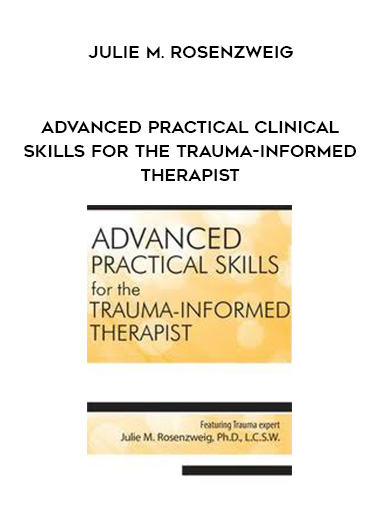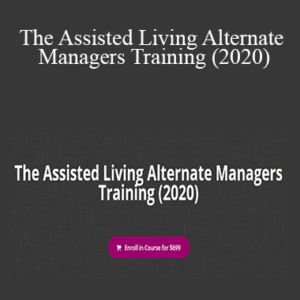[Download Now] Advanced Practical Clinical Skills for the Trauma-Informed Therapist – Julie M. Rosenzweig
Advanced Practical Clinical Skills for the Trauma-Informed Therapist – Julie M. Rosenzweig
You can help meet the demand for mental health professionals with expertise in providing trauma therapy
You’ve attended numerous “Trauma101” trainings – you know the basics. Now it’s time for the next level. Attend this seminar to both learn (and hone) the advanced clinical skills you need to move your clients toward sustained emotional safety and regulation. Learn practical skills to increase distress tolerance, deactivate memory triggers, and reduce fight, flight or freeze reactions in your clients.
Isn’t it time for you to stop feeling stuck, wondering what to do differently, and worrying that your clients are discouraged and sensing change is hopeless?
Think about your most challenging case–write down why it is so difficult and bring it with you. If the issue is case conceptualization, an inadequate therapeutic alliance, traumatic transference, or an incoherent client narrative of the trauma, then this recording will give you new ways of thinking and acting therapeutically.
Highlights of the training include:
- Key neuropsychological principles of trauma therapy
- Become better able to identify and understand therapeutic impasses and Learn new techniques to get unstuck
- Know when the client is ready for processing traumatic memories
- Learn how to slow down and track moment-to-moment with your clients
The need for clinicians with expertise in treating trauma has never been greater. Trauma treatment is evolving constantly. By attending this seminar you’ll be taking a step toward current, deeper knowledge, proficiency, and effectiveness as the clinician you have always aspired to be.
- Describe neuropsychological principles that guide trauma therapy.
- Explain how to apply affective and somatic regulation strategies that are anchored in neuroscientific research and theoretical relational concepts.
- Summarize the core experience of post-traumatic isolation, and implement approaches to join with a client that disrupts the sense of aloneness.
- Explain how to recognize the opportunities in therapeutic impasses, and how to reengage the therapeutic relationship.
- Describe how to ascertain client readiness to process trauma memories, and increase meaning making and narrative coherence.
- List practical self-care strategies that promote well-being and minimize vicarious traumatization.
Creating a Trauma Therapy Framework
- Neuropsychological principles
- Attachment and regulatory concepts
- Identify your vulnerability hot spots
- Setting your clinical intention
The Therapeutic Alliance
- Listening for adaptive attachment narratives
- Use of self and the intersubjective experience
- Interrupting client’s sense of aloneness through using ‘we’ language
Establishing and Sustaining Emotional Safety
- Strengthen the client’s internal resources
- Provide practical neurobiology info to clients
- See, hear, and acknowledge therapeutic ruptures
- Steps in healing ruptures, including the art of apology
Recognizing Therapeutic Impasses and Getting Unstuck
- It’s not about client resistance
- Opportunities in impasses
- Being fully present
- Pause, pacing and moment-to-moment tracking
Traumatic Transference
- Vicarious traumatization prevention and intervention
- Compassion fatigue buffers
- Self-care: before, during and after
Neuroscience-Informed Trauma Treatment Strategies
- Memory processing & reconsolidation
- Choosing bottom-up versus top-down processing
- Paying attention to the body
- Moving through emotional activation
Building Narrative Coherence & Restoring Resilience
- Identifying survival-based sources of courage, creativity & innovation
- Re-vising meanings in trauma stories
- Reflective functioning (mentalizing)
- Techniques and tips from narrative therapy
Additional Considerations
- Sex & gender
- Couples and trauma-informed approaches
- When to seek consultation
Get Advanced Practical Clinical Skills for the Trauma-Informed Therapist of author Julie M. Rosenzweig
Delivery Method
– After your purchase, you’ll see a View your orders link which goes to the Downloads page. Here, you can download all the files associated with your order.
– Downloads are available once your payment is confirmed, we’ll also send you a download notification email separate from any transaction notification emails you receive from coursesblock.com
– Since it is a digital copy, our suggestion is to download and save it to your hard drive. In case the link is broken for any reason, please contact us and we will resend the new download link.
– If you cannot find the download link, please don’t worry about that. We will update and notify you as soon as possible at 8:00 AM – 8:00 PM (UTC 8).
Thank You For Shopping With Us!








